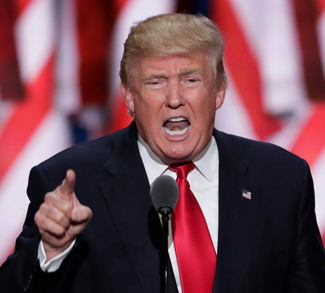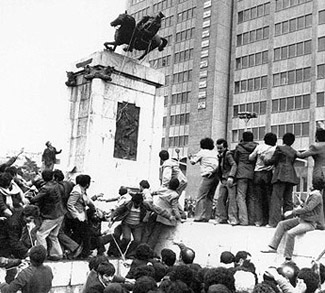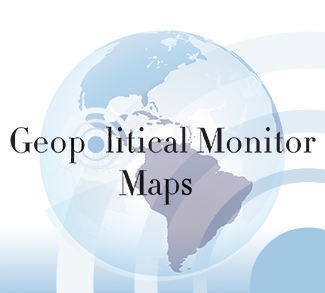There are two major tenets of President Trump’s Middle East policy: 1) a general disengagement with no new military commitments; and 2) a renewed focus on conventional US allies such as Israel and Saudi Arabia.
The prevailing logic is that the United States can ensure regional stability via strong and dependable allies. It’s a policy that resembles that of past US administrations, and it has made a comeback thanks to intervention exhaustion in Afghanistan and Iraq and, perhaps more importantly, the shale revolution which has made Middle East oil reserves strategically redundant.
Yet the Middle East is a region that has become synonymous with sectarian conflict, and this conflict risks worsening should the US disengage and picks sides. The Shiite-Sunni split has become near genocidal at times, as seen in the civil wars in Iraq and Syria. Climate factors are also threatening to strain water and food resources in the region, leading to mass migration, political upheaval, and war (see our recent backgrounder on climate change in the Middle East.)
For US policy planners, the Middle East is a hard region to look away from: violence is never far off, and local clashes have a tendency of cascading into full-fledged regional wars. Should President Trump abdicate the United States’ seat at the table, there’s no guarantee it will still be empty should he or future US presidents change their mind.
Saudi Arabia
US-Saudi relations have been rebooted under President Trump, with the United States pivoting back toward one of its most stalwart and longstanding allies in the region. A kind of tunnel vision has prevailed during the Trump administration, stripping the bilateral relationship of some of its more controversial aspects, including the Kingdom’s human rights record, its support of Salafist ideology worldwide, and its dogged pursuit of the shale-OPEC oil price war. What remains is a pure security calculus and an apparent willingness on President Trump’s part to stand by this US ally of over 70 years regardless of what comes.
President Trump’s warm embrace of Riyadh contrasts with President Obama’s strategy of rebalancing US foreign policy in the Middle East away from an overreliance on Saudi Arabia and Israel. Now safe in the knowledge of its place under the US security umbrella, the Saudi government has adopted a more proactive foreign policy. This newfound assertiveness has manifested in several ways:
- The war in Yemen. Saudi Arabia has ramped up its war against Iran-backed Houthi rebels in neighboring Yemen. There is currently no obvious path to military victory in Yemen, yet the massive humanitarian cost to local populations is clear for all to see. Such human rights concerns have been decoupled from US foreign policy, and US arms sales to the Kingdom have been accelerated under President Trump. Reversing a 2016 Obama administration ban, the Trump administration agreed to sell over $350 billion worth of US arms to Saudi Arabia over the next 10 years (this trip was also Trump’s first overseas visit as president).
- The Qatar blockade. Saudi Arabia has joined together with the United Arab Emirates, Bahrain, and Egypt to impose an unprecedented air and sea blockade of Qatar, a country it accuses of supporting terrorism and promoting Iran’s interests. In the early days of the blockade, it appeared as though the move had President Trump’s blessing – a peculiar tactic given the presence of a large and geopolitically crucial US military base just southwest of Doha. (For more information on the Qatar crisis, refer to our backgrounder).
- Domestic crackdown against Shiites and 2012 protesters. Confident that no rebuke will be forthcoming from the United States, Saudi Arabia has been engaging in some score settling over abortive 2012 protests in Shiite areas of the country. The Saudi government has also been cracking down on human rights campaigners within the Kingdom, accusing them of working as foreign spies or belonging to the Muslim Brotherhood.




